大学英语基础教程四
- 格式:doc
- 大小:37.00 KB
- 文档页数:3
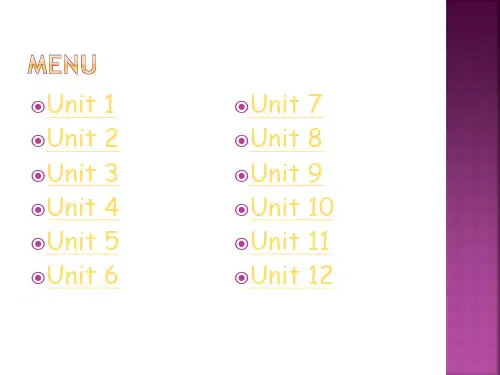
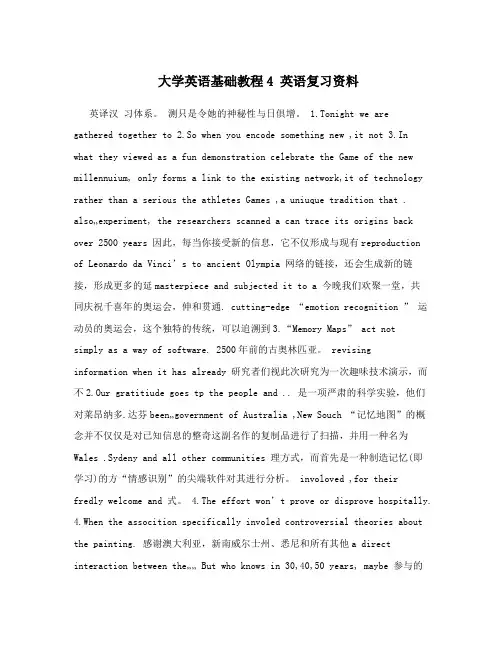
大学英语基础教程4 英语复习资料英译汉习体系。
测只是令她的神秘性与日俱增。
1.Tonight we are gathered together to 2.So when you encode something new ,it not 3.Inwhat they viewed as a fun demonstration celebrate the Game of the new millennuium, only forms a link to the existing network,it of technology rather than a serious the athletes Games ,a uniuque tradition that . also…experiment, the researchers scanned a can trace its origins back over 2500 years 因此,每当你接受新的信息,它不仅形成与现有reproductionof Leonardo da Vinci’s to ancient Olympia 网络的链接,还会生成新的链接,形成更多的延masterpiece and subjected it to a 今晚我们欢聚一堂,共同庆祝千喜年的奥运会,伸和贯通. cutting-edge “emotion recognition ” 运动员的奥运会,这个独特的传统,可以追溯到3.“Memory Maps” act notsimply as a way of software. 2500年前的古奥林匹亚。
revisinginformation when it has already 研究者们视此次研究为一次趣味技术演示,而不2.Our gratitiude goes tp the people and .. 是一项严肃的科学实验,他们对莱昂纳多.达芬been…government of Australia ,New Souch “记忆地图”的概念并不仅仅是对已知信息的整奇这副名作的复制品进行了扫描,并用一种名为Wales .Sydeny and all other communities 理方式,而首先是一种制造记忆(即学习)的方“情感识别”的尖端软件对其进行分析。
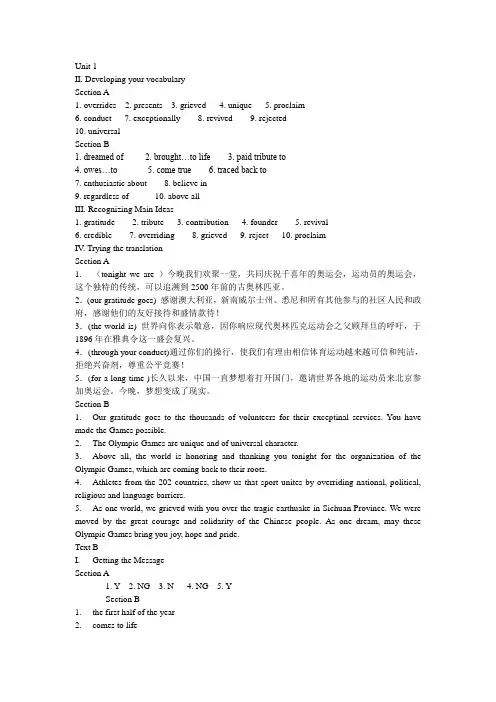
Unit 1II. Developing your vocabularySection A1. overrides2. presents3. grieved4. unique5. proclaim6. conduct7. exceptionally8. revived9. rejected10. universalSection B1. dreamed of2. brought…to life3. paid tribute to4. owes…to5. come true6. traced back to7. enthusiastic about 8. believe in9. regardless of 10. above allIII. Recognizing Main Ideas1. gratitude2. tribute3. contribution4. founder5. revival6. credible7. overriding8. grieved9. reject 10. proclaimIV. Trying the translationSection A1. (tonight we are )今晚我们欢聚一堂,共同庆祝千喜年的奥运会,运动员的奥运会,这个独特的传统,可以追溯到2500年前的古奥林匹亚。
2.(our gratitude goes) 感谢澳大利亚,新南威尔士州、悉尼和所有其他参与的社区人民和政府,感谢他们的友好接待和盛情款待!3.(the world is) 世界向你表示敬意,因你响应现代奥林匹克运动会之父顾拜旦的呼吁,于1896年在雅典令这一盛会复兴。
4.(through your conduct)通过你们的操行,使我们有理由相信体育运动越来越可信和纯洁,拒绝兴奋剂,尊重公平竞赛!5.(for a long time )长久以来,中国一直梦想着打开国门,邀请世界各地的运动员来北京参加奥运会。
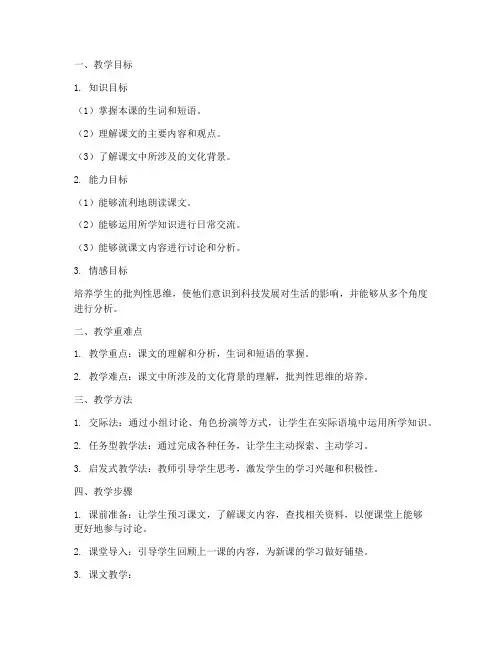
一、教学目标1. 知识目标(1)掌握本课的生词和短语。
(2)理解课文的主要内容和观点。
(3)了解课文中所涉及的文化背景。
2. 能力目标(1)能够流利地朗读课文。
(2)能够运用所学知识进行日常交流。
(3)能够就课文内容进行讨论和分析。
3. 情感目标培养学生的批判性思维,使他们意识到科技发展对生活的影响,并能够从多个角度进行分析。
二、教学重难点1. 教学重点:课文的理解和分析,生词和短语的掌握。
2. 教学难点:课文中所涉及的文化背景的理解,批判性思维的培养。
三、教学方法1. 交际法:通过小组讨论、角色扮演等方式,让学生在实际语境中运用所学知识。
2. 任务型教学法:通过完成各种任务,让学生主动探索、主动学习。
3. 启发式教学法:教师引导学生思考,激发学生的学习兴趣和积极性。
四、教学步骤1. 课前准备:让学生预习课文,了解课文内容,查找相关资料,以便课堂上能够更好地参与讨论。
2. 课堂导入:引导学生回顾上一课的内容,为新课的学习做好铺垫。
3. 课文教学:(1)让学生朗读课文,注意语音语调的准确性和流利度。
(2)讲解生词和短语,让学生能够正确理解和运用。
(3)分析课文内容,引导学生从多个角度理解课文观点。
4. 文化背景介绍:讲解课文中所涉及的文化背景,帮助学生更好地理解课文。
5. 课堂讨论:(1)分组讨论:让学生就课文内容进行分组讨论,分享自己的观点和看法。
(2)全班讨论:邀请学生就讨论结果进行分享,其他学生和教师进行评价和补充。
6. 任务完成:(1)分组任务:让学生分组完成与课文相关的任务,如编写对话、表演短剧等。
(2)全班展示:邀请学生就任务完成情况进行展示,其他学生和教师进行评价和反馈。
7. 课堂小结:对本课内容进行总结,强调重点和难点。
8. 课后作业:布置相关作业,巩固所学知识。
五、教学评价1. 课堂表现:观察学生在课堂上的参与程度、发言情况和表现。
2. 作业完成情况:检查学生作业的完成质量,了解学生对知识的掌握程度。
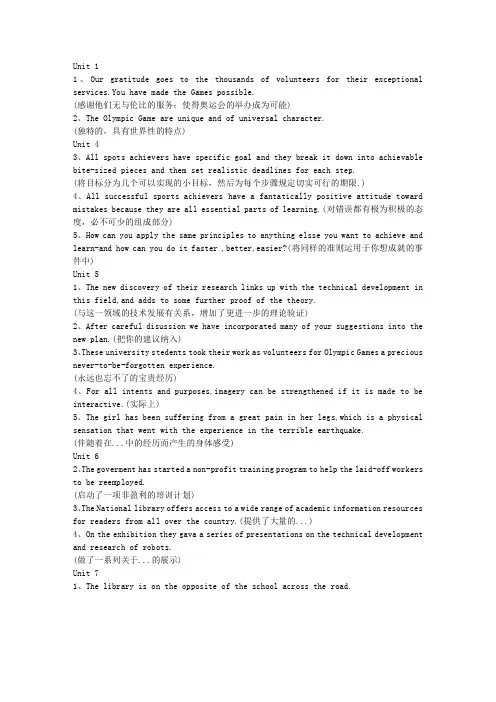
Unit 11、Our gratitude goes to the thousands of volunteers for their exceptional services.You have made the Games possible.(感谢他们无与伦比的服务;使得奥运会的举办成为可能)2、The Olympic Game are unique and of universal character.(独特的,具有世界性的特点)Unit 43、All spots achievers have specific goal and they break it down into achievable bite-sized pieces and them set realistic deadlines for each step.(将目标分为几个可以实现的小目标,然后为每个步骤规定切实可行的期限.)4、All successful sports achievers have a fantatically positive attitude toward mistakes because they are all essential parts of learning.(对错误都有极为积极的态度,必不可少的组成部分)5、How can you apply the same principles to anything elsse you want to achieve and learn-and how can you do it faster ,better,easier?(将同样的准则运用于你想成就的事件中)Unit 51、The new discovery of their research links up with the technical development in this field,and adds to some further proof of the theory.(与这一领域的技术发展有关系,增加了更进一步的理论验证)2、After careful disussion we have incorporated many of your suggestions into the new plan.(把你的建议纳入)3、These university stedents took their work as volunteers for Olympic Games a precious never-to-be-forgotten experience.(永远也忘不了的宝贵经历)4、For all intents and purposes,imagery can be strengthened if it is made to be interactive.(实际上)5、The girl has been suffering from a great pain in her legs,which is a physical sensation that went with the experience in the terrible earthquake.(伴随着在...中的经历而产生的身体感受)Unit 62、The goverment has started a non-profit training program to help the laid-off workers to be reemployed.(启动了一项非盈利的培训计划)3、The National library offers access to a wide range of academic information resources for readers from all over the country.(提供了大量的...)4、On the exhibition they gava a series of presentations on the technical development and research of robots.(做了一系列关于...的展示)Unit 71、The library is on the opposite of the school across the road.。
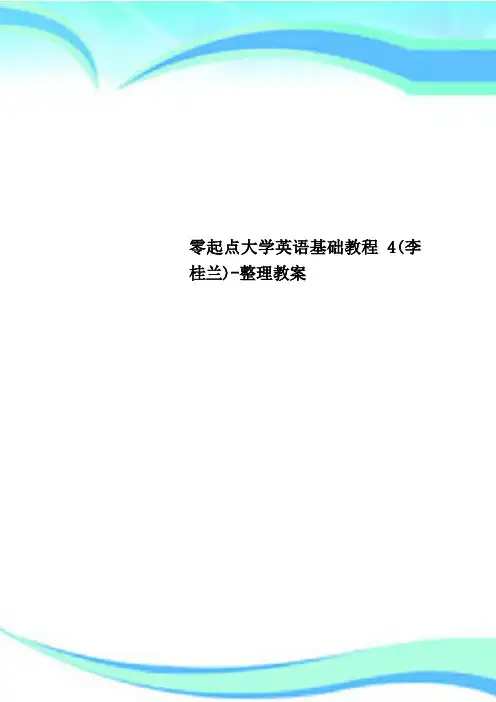
零起点大学英语基础教程4(李桂兰)-整理教案————————————————————————————————作者:————————————————————————————————日期:Unit 1 personal QualitiesI. Teaching aims and demands1. Understand the background knowledge2. Learn about the new words and phrases3. Grasp the main idea and structure of the text4. Conduct a series of reading, listening, speaking and writing activitiesII. Teaching importance and difficulties1.Background information2.The usage of some new words and phrases3.Some sentence patterns difficult to understandIII. Teaching methodsA combination of traditional teaching methods with the communicative approach will be adopted. Special attention should be paid to classroom interaction. More encouragement is needed and more guidance will be given to them in their extracurricular study. Use the multimedia device where necessary.IV. Teaching procedurea. Warming-up Activities1.Duty ReportHave a brainstorming about words to describe personal qualitiesrmation related to the text1) Cross-cultural communicationThe key to effective cross-cultural communication is knowledge. First, it is essential that people understand the potential problems of cross-cultural communication, and make a conscious effort to overcome these problems. Second, it is important to assume that one’s efforts will not always be successful, and adjust one’s behavior appropriately.For example, one should always assume that there is a significant possibility that cultural differences are causing communication problems, and be willing to be patient and forgiving, rather than hostile and aggressive, if problems develop. One should respond slowly and carefully in cross-cultural exchanges, not jumping to the conclusion that you know what is being thought and said.Active listening can sometimes be used to check this out–by repeating what one thinks he or she heard, one can confirm that one understands the communication accurately. If words are used differently between languages or cultural groups, however, even active listening can overlook misunderstandings.2) Personal qualitiesPersonal qualities are personal characteristics of an individual. They are what make up one's personality. They help a person get along in a new situation. For example, dependability and patience are qualities that employers would like a good worker to have. Other qualities employers value are: honesty, assertiveness, flexibility, problem solving, friendliness, intelligence, leadership, enthusiasm, and a good sense of humor.Most employers want people who are dependable and who get along with others. Though skills are important, an employer will select new employees based on their personal qualities as well.b. Language points1. Personal qualities generally have either positive or negative connotations.一般来说,一个人的品质包括两个方面:积极的和消极的。
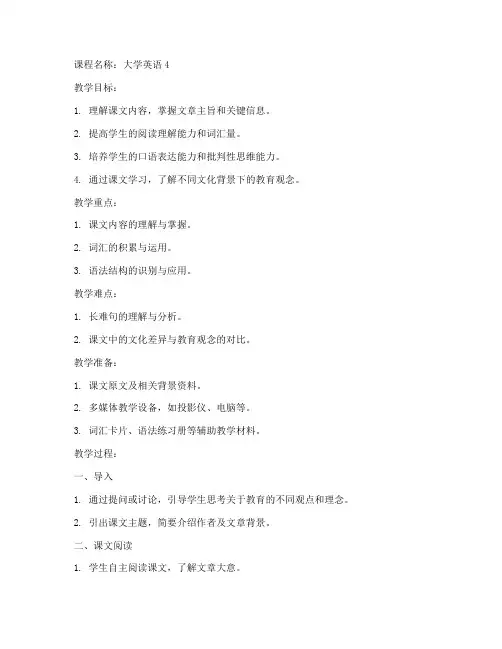
课程名称:大学英语4教学目标:1. 理解课文内容,掌握文章主旨和关键信息。
2. 提高学生的阅读理解能力和词汇量。
3. 培养学生的口语表达能力和批判性思维能力。
4. 通过课文学习,了解不同文化背景下的教育观念。
教学重点:1. 课文内容的理解与掌握。
2. 词汇的积累与运用。
3. 语法结构的识别与应用。
教学难点:1. 长难句的理解与分析。
2. 课文中的文化差异与教育观念的对比。
教学准备:1. 课文原文及相关背景资料。
2. 多媒体教学设备,如投影仪、电脑等。
3. 词汇卡片、语法练习册等辅助教学材料。
教学过程:一、导入1. 通过提问或讨论,引导学生思考关于教育的不同观点和理念。
2. 引出课文主题,简要介绍作者及文章背景。
二、课文阅读1. 学生自主阅读课文,了解文章大意。
2. 教师提问,检查学生对课文内容的理解。
3. 针对重点句子和段落,进行详细讲解和分析。
三、词汇学习1. 教师带领学生总结课文中的重点词汇。
2. 通过例句、图片等方式,帮助学生记忆和理解词汇。
3. 设计词汇练习,巩固学生对词汇的掌握。
四、语法讲解1. 分析课文中的语法结构,如时态、语态、非谓语动词等。
2. 结合例句,讲解语法规则。
3. 设计语法练习,让学生运用所学语法知识。
五、文化差异与教育观念1. 引导学生思考课文中所体现的文化差异。
2. 对比中西方教育观念,引导学生形成自己的看法。
3. 组织小组讨论,让学生分享自己的观点。
六、课堂小结1. 回顾本节课所学内容,强调重点和难点。
2. 布置课后作业,如翻译课文、写读后感等。
七、课后作业1. 翻译课文,加深对课文内容的理解。
2. 收集有关教育观念的资料,进行对比分析。
3. 写一篇关于教育观念的短文,表达自己的观点。
教学反思:1. 关注学生的个体差异,调整教学策略,确保每个学生都能参与课堂活动。
2. 注重培养学生的阅读兴趣,激发学生的自主学习能力。
3. 加强课堂互动,提高学生的口语表达能力和批判性思维能力。
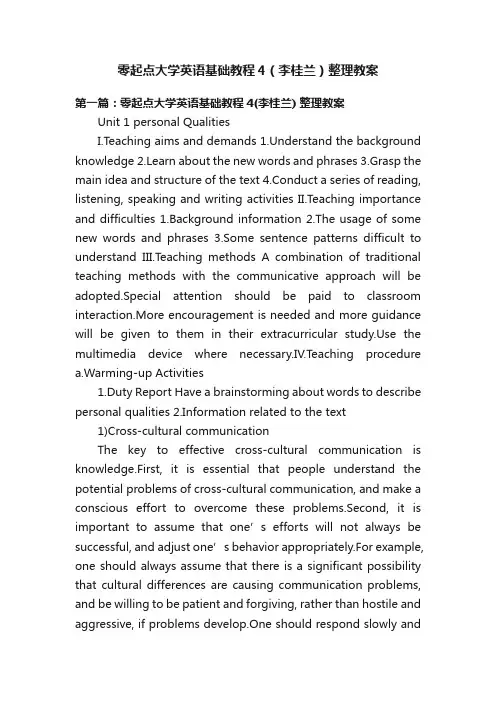
零起点大学英语基础教程4(李桂兰)整理教案第一篇:零起点大学英语基础教程4(李桂兰) 整理教案Unit 1 personal QualitiesI.Teaching aims and demands 1.Understand the background knowledge 2.Learn about the new words and phrases 3.Grasp the main idea and structure of the text 4.Conduct a series of reading, listening, speaking and writing activities II.Teaching importance and difficulties 1.Background information 2.The usage of some new words and phrases 3.Some sentence patterns difficult to understand III.Teaching methods A combination of traditional teaching methods with the communicative approach will be adopted.Special attention should be paid to classroom interaction.More encouragement is needed and more guidance will be given to them in their extracurricular e the multimedia device where necessary.IV.Teaching procedurea.Warming-up Activities1.Duty Report Have a brainstorming about words to describe personal qualitiesrmation related to the text1)Cross-cultural communicationThe key to effective cross-cultural communication is knowledge.First, it is essential that people understand the potential problems of cross-cultural communication, and make a conscious effort to overcome these problems.Second, it is importan t to assume that one’s efforts will not always be successful, and adjust one’s behavior appropriately.For example, one should always assume that there is a significant possibility that cultural differences are causing communication problems, and be willing to be patient and forgiving, rather than hostile and aggressive, if problems develop.One should respond slowly andcarefully in cross-cultural exchanges, not jumping to the conclusion that you know what is being thought and said.Active listening can sometimes be used to check this out–by repeating what one thinks he or she heard, one can confirm that one understands the communication accurately.If words are used differently between languages or cultural groups, however, even active listening can overlook misunderstandings.2)Personal qualitiesPersonal qualities are personal characteristics of an individual.They are what make up one's personality.They help a person get along in a new situation.For example, dependability and patience are qualities that employers would like a good worker to have.Other qualities employers value are: honesty, assertiveness, flexibility, problem solving, friendliness, intelligence, leadership, enthusiasm, and a good sense of humor.Most employers want people who are dependable and who get along with others.Though skills are important, an employer will select new employees based on their personal qualities as nguage points1.Personal qualities generally have either positive or negative connotations.一般来说,一个人的品质包括两个方面:积极的和消极的。
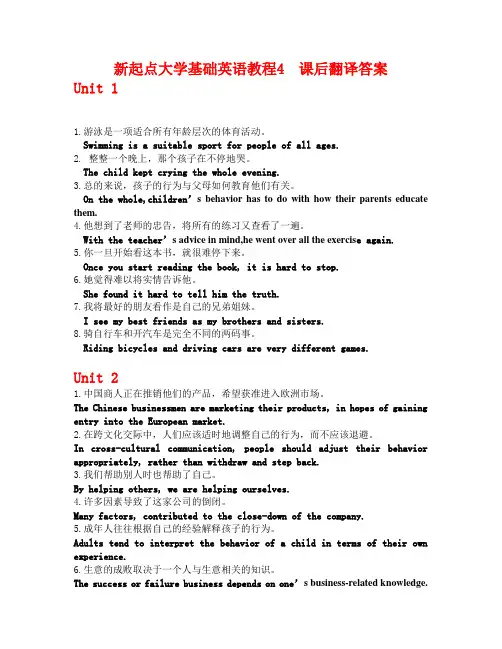
新起点大学基础英语教程4 课后翻译答案Unit 11.游泳是一项适合所有年龄层次的体育活动。
Swimming is a suitable sport for people of all ages.2. 整整一个晚上,那个孩子在不停地哭。
The child kept crying the whole evening.3.总的来说,孩子的行为与父母如何教育他们有关。
On the whole,children’s behavior has to do with how their parents educate them.4.他想到了老师的忠告,将所有的练习又查看了一遍。
With the teacher’s advice in mind,he went over all the exercis e again.5.你一旦开始看这本书,就很难停下来。
Once you start reading the book, it is hard to stop.6.她觉得难以将实情告诉他。
She found it hard to tell him the truth.7.我将最好的朋友看作是自己的兄弟姐妹。
I see my best friends as my brothers and sisters.8.骑自行车和开汽车是完全不同的两码事。
Riding bicycles and driving cars are very different games.Unit 21.中国商人正在推销他们的产品,希望获准进入欧洲市场。
The Chinese businessmen are marketing their products, in hopes of gaining entry into the European market.2.在跨文化交际中,人们应该适时地调整自己的行为,而不应该退避。
In cross-cultural communication, people should adjust their behavior appropriately, rather than withdraw and step back.3.我们帮助别人时也帮助了自己。
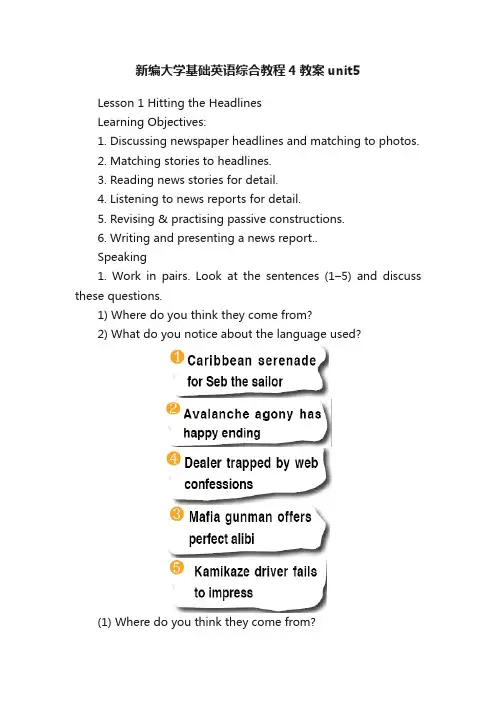
新编大学基础英语综合教程4教案unit5Lesson 1 Hitting the HeadlinesLearning Objectives:1. Discussing newspaper headlines and matching to photos.2. Matching stories to headlines.3. Reading news stories for detail.4. Listening to news reports for detail.5. Revising & practising passive constructions.6. Writing and presenting a news report..Speaking1. Work in pairs. Look at the sentences (1–5) and discuss these questions.1) Where do you think they come from?2) What do you notice about the language used?(1) Where do you think they come from?They are all headlines from newspaper stories.2)What do you notice about the language used?They use simplified language, e.g. Omitting articles and simplifying tenses. They also use assonance (avalanche agony) and alliteration (Seb the Sailor). Neat, catchy and established phrases (happy ending, perfect alibi) are used to attract the reader.2. Match the sentences (1–5) to the pictures (a–e).Reading: Lexical preparation(1) accuse: v. (accuse sb. of sth.) : to say that sb. has done sth. wrong or is guilty of sth.e.g. The government was accused of incompetence.2) charge: v. (charge sb. with sth./ with doing sth.): to accuse sb formally of a crime so that there can be a trial in a court of lawe.g. He was charged with murder.3) convict: v. [often passive] (convict sb. of sth.): to decide and state officially in a court of law that sb. is guilty of a crimee.g. He was convicted of fraud.4) allege: v. [often passive] (formal) to state sth. as a fact but without giving proof (It is alleged that…)e.g. —It is alleged that he mistreated the prisoners.—He is alleged to have mistreated the prisoners.5) chance: [U] the way that some things happen without any cause that you can see or understand (by chance)e.g. I met her by chance (=without planning to) at the airport.6) impress: v. (formal) to have a great effect on sth., esp. sb’s mind, imagination, etc. (impress sth. / itself on sth.)7) catch up with sb. :①if the police or authorities catch up with sb., they find and punish them after some timee.g. The law caught up with him years later when he had moved to Spain.②to reach sb. who is ahead by going faster or reach the same level or standard as sb. who was better or more advancede.g. He had to work hard to catch up with the others after missing a term through illness.8) be / get caught up in sth. : to become involved in sth., especially when you do not want to bee.g. Innocent passers-by got caught up in the riot.9) attempt: n. an act of trying to do sth., especially sth. difficult, often with no success(in an attempt to do)(make an attempt to do)Reading1. Match the first lines of each news story below (a–e) to the full stories (i–v). What do all the first lines have in common?a) A Mafia hitman who was believed to have been responsible for ...b) A British climber made an extraordinary journey ...c) A Japanese man drove his car through a train station ...d) A man has been jailed for three years ...e) A 15-year-old boy from Cowes has become the youngest person ...What do all the first lines have in common?a) A Mafia hitman who was believed to have been responsible for ...b) A British climber made an extraordinary journey ...c) A Japanese man drove his car through a train station ...d) A man has been jailed for three years ...e) A 15-year-old boy from Cowes has become the youngest person ...The first lines introduce the main character, often with a qualifying adjective —mafia, British, etc.2. Read the news stories and answer these questions.1) Why did Graham Burdon post the message?Because he wanted to get in touch with some old school friends.2) Why is Torre’s perfect alibi such an “original”one?Because he confessed to having committed another murder on the same day.3) How did Seb Clover feel when he arrived?He felt very tired.2. Read the news stories and answer these questions.4) How did Saito try to attract the woman’s attention?By driving dangerously up stairs and along a corridor in a train station.5) Why was Trevor Jones lucky to have been found by the Romanian family?Because the village is usually uninhabited in winter.3. Discuss these questions with a partner.1) Which stories are the most humorous?Stories i, ii and iv.2) Identify any humorous or ironic touches in these texts.-- he was busy killing / he couldn't possibly have shot (ii);-- in a bid to get noticed (iv).4. Translate the following sentences into English.(1) 他被判处死刑,其犯罪团伙因杀害20人已受到指控。
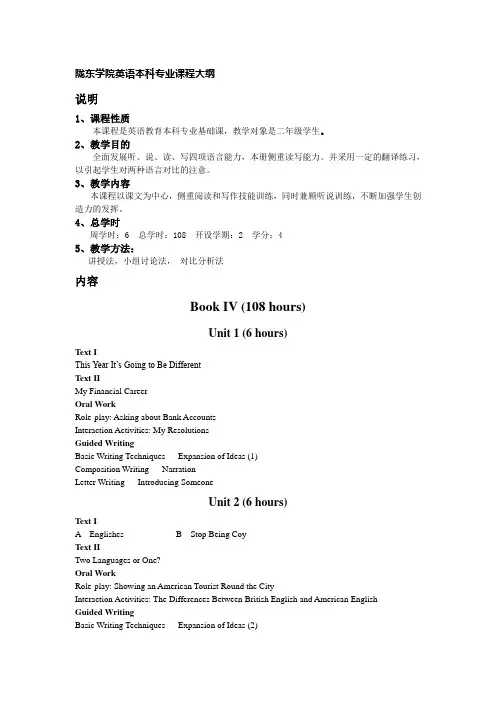
陇东学院英语本科专业课程大纲说明1、课程性质本课程是英语教育本科专业基础课,教学对象是二年级学生。
2、教学目的全面发展听、说、读、写四项语言能力,本册侧重读写能力。
并采用一定的翻译练习,以引起学生对两种语言对比的注意。
3、教学内容本课程以课文为中心,侧重阅读和写作技能训练,同时兼顾听说训练,不断加强学生创造力的发挥。
4、总学时周学时:6 总学时:108 开设学期:2 学分:45、教学方法:讲授法,小组讨论法,对比分析法内容Book IV (108 hours)Unit 1 (6 hours)Text IThis Year It’s Going to Be DifferentText IIMy Financial CareerOral WorkRole-play: Asking about Bank AccountsInteraction Activities: My ResolutionsGuided WritingBasic Writing Techniques --- Expansion of Ideas (1)Composition Writing --- NarrationLetter Writing --- Introducing SomeoneUnit 2 (6 hours)Text IA EnglishesB Stop Being CoyText IITwo Languages or One?Oral WorkRole-play: Showing an American Tourist Round the CityInteraction Activities:The Differences Between British English and American EnglishGuided WritingBasic Writing Techniques --- Expansion of Ideas (2)Composition Writing --- ExpositionLetter Writing --- Letter Accompanying a PresentUnit 3 (6 hours)Text ISalvationText IIThe RumorOral WorkRole-play: What a Relief!Interaction Activities: Rumor Is a Fearful ThingGuided WritingBasic Writing Techniques--- The Parallel Construction Composition Writing --- NarrationLetter Writing --- Answering a Letter Accompanying a PresentUnit 4 (6 hours)Text IWriting Between the LinesText IIHandling the Knowledge ExplosionOral WorkRole-play: Buying a DictionaryInteraction Activities:The Way I Do My ReadingGuided WritingBasic Writing Techniques --- Comparison, Simile, and Metaphor Composition Writing --- ArgumentationUnit 5 (6 hours)Text INetwork Designer --- Tim Berners-LeeText IIAngels on the InternetOral Work1. Role-play: Discussing Plans after Graduation2. Interaction Activities: Parents and ChildGuided Writing1. Basic Writing Techniques --- Contrast2. Composition Writing --- Narration3. Letter Writing --- Asking after a Friend’s HealthUnit 6 (6 hours)Text IPredators, Parasites and Other RelationshipsText IISlaughter of the ElephantsOral WorkRole-play: For or Against?Interaction Activitie s: Parasites in Human SocietyGuided WritingBasic Writing Techniques --- Expansion of Words (1)Composition Writing --- ExpositionLetter Writing --- Answering a Letter Asking After the Writer’s HealthUnit 7 (6hours)Text IA Sunrise on the VeldText IITiny Killers on the MarchOral WorkRole-play: Telling a Story about InsectsInteraction Activities: A Discussion on the Psychology of the Boy in “A Sunrise on the Veld”Guided WritingBasic Writing Techniques --- Expansion of Words (2)Composition Writing --- NarrationLetter Writing --- Letters of CondolencesUnit 8 (6 hours)Text IAntarcticaText IIThe underworldOral WorkRole-play: Back from an Antarctic ExpeditionInteraction Activities: A Report on an Antarctic ExpeditionGuided WritingBasic Writing Techniques --- Expansion of NounsComposition Writing --- Exposition and Expansion of NounsLetter Writing --- Confirming a Previous Verbal ArrangementUnit 9 (6hours)Text IThe pearlText IIGoldOral WorkRole-play: Borrowing a BookInteraction Activities: Snobbishness in Human RelationshipsGuided WritingComposition Writing --- Narration and DescriptionLetter Writing --- Answering a Letter Confirming a Verbal ArrangementUnit 10 (6 hours)Text IFrom Composer to Interpreter to ListenerText IIThe Jazz SceneOral WorkRole-play: What a Pity!Interaction Activities: Music I like and DislikeGuided WritingBasic Writing Techniques --- Expansion of the Sentence BaseComposition Writing --- ExpositionLetter Writing --- Des cribing the Changes in One’s Own TownUnit 11 (6 hours)Text IA Friend in NeedText IIThe Dinner PartyOral WorkRole-play: A Conversation Between Octavian and His MotherInteraction Activities: Comparing Jimmy Wells in “After Twenty Years” with Edward Hyde Burton in “A Friend in Need”Guided WritingBasic Writing Techniques --- Normal and Inverted Order of sentences (1)Composition Writing --- Story-TellingLetter Writing --- Welcoming a Friend to One’s Town / City for a VisitUnit 12 (6 hours)Text IUniversity DaysText IIThe Aim of a University EducationOral WorkRole-play: An Interview by a Foreign Newspaper Reporter with a Chinese University Student Guided WritingBasic Writing Techniques --- Normal and Inverted Order of sentences (2)Composition Writing --- Narration and ExpositionLetter Writing --- Answering a Friend’s Letter, Suggesting Places to VisitUnit 13 (6 hours)Text IDolly’s False LegacyText IIThe Biotech CenturyOral WorkRole-play: Whatever You LikeInteraction Activities: Cloning and Its Moral and Medical ConsequencesGuided WritingBasic Writing Techniques --- Improving Your sentences (1)Letter Writing --- Describing One’s Life on CampusUnit 14 (6 hours)Text IWater, Water EverywhereText IIA Near-Disaster In SpaceOral WorkRole-play: Going on HolidayInteraction Activities: A Discussion on “How Space Stations Serve mankind”Guided WritingBasic Writing Techniques --- Improving Your sentences (2)Composition Writing --- NarrationLetter Writing --- Letter of ComplaintUnit 15 (6 hours)Text IGettysburg AddressesText IIAbraham Lincoln and the American Civil WarOral WorkRole-play: An Argument about the Two Addresses at GettysburgInteraction Activities: The Text I Like Best in A New English Course, Level 4Guided WritingBasic Writing Techniques --- Improving Your sentences (3)Composition Writing --- Persuasion and NarrationLetter Writing --- Letter of Complaint to a Department Store参考书目李观仪.新编英语教程(教师用书)(第4册)[M]. 上海:上海外语教育出版社,2000撰稿:朱玉霞编审:苏彩琴。
杨治中新起点大学基础英语教程读写教程4答案1、She works in a hospital. She is a(n) _______. [单选题] *A. managerB. engineerC. doctor(正确答案)D. patient2、They will hold the party if they _____ the project on time. [单选题] *A. will completeB. complete(正确答案)C.completedD. had completed3、In fact, Beethoven did something brave than dying. [单选题] *A. 勇敢(正确答案)B. 冒险C. 可怕D. 奇妙4、I passed the test, I _____ it without your help. [单选题] *A.would not passB. wouldn't have passed(正确答案)C. didn't passD.had not passed5、I have seldom seen my father()pleased with my progress as he is now. [单选题] *A. so(正确答案)B. veryC. tooD. rather6、—Why is Mary asking Bob about the school trip? —Because she wants to know ______.()[单选题] *A. how does he think of the tripB. what does he think of the tripC. what he likes the tripD. how he likes the trip(正确答案)7、——Have you()your friend Bill recently? ———No, he doesnt often write to me. [单选题] *A. heard aboutB. heard ofC. heard from (正确答案)D. received from8、Many children have to _______ their parents. [单选题] *A. divide intoB. put onC. depend on(正确答案)D. take on9、He’s so careless that he always _______ his school things at home. [单选题] *A. forgetsB. leaves(正确答案)C. putsD. buys10、_______ is on September the tenth. [单选题] *A. Children’s DayB. Teachers’Day(正确答案)C. Women’s DayD. Mother’s Day11、He always did well at school _____ having to do part-time jobs every now and then. [单选题] *A despite ofB. in spite of(正确答案)C. regardless ofD in case of12、--_______ I borrow these magazines?--Sorry, only the magazines over there can be borrowed. [单选题] *A. MustB. WouldC. May(正确答案)D. Need13、16.Lily is a lovely girl. We all want to ________ friends with her. [单选题] *A.haveB.make(正确答案)C.doD.take14、Mary _______ a small gift yesterday, but she didn’t _______ it. [单选题] *A. accepted; receiveB. received; accept(正确答案)C. receives; acceptedD. accepts; received15、Tom will _______ me a gift from Japan. [单选题] *A. takeB. getC. carryD. bring(正确答案)16、Sitting at the back of the room()a very shy girl with two bright eyes. [单选题] *A. is(正确答案)B. areC. hasD. there was17、--It is Sunday tomorrow, I have no idea what to do.--What about _______? [单选题] *A. play computer gamesB. go fishingC. climbing the mountain(正确答案)D. see a film18、32.There are about __________ women doctors in this hospital. [单选题] * A.two hundred ofB.two hundreds ofC.two hundredsD.two hundred (正确答案)19、Words are windows()you can look into the past. [单选题] *A. through which(正确答案)B. through thatC. whichD. whose20、Jim, it’s dark now. Please _______ the light in the room. [单选题] *A. turn on(正确答案)B. turn upC. turn offD. turn down21、Jim wants to hang out with his friends at night, but his parents don’t allow him ______ so. ()[单选题] *A. doB. doneC. to do(正确答案)D. doing22、I’d like to go with you, ______ I’m too busy. [单选题] *A. orB. andC. soD. but(正确答案)23、Don’t talk _______. Your grandmother is sleeping now. [单选题] *A. happilyB. nearlyC. loudly(正确答案)D. hardly24、--Henry treats his secretary badly.--Yes. He seems to think that she is the _______ important person in the office. [单选题] *A. littleB. least(正确答案)C. lessD. most25、You should take the medicine after you read the _______. [单选题] *A. linesB. wordsC. instructions(正确答案)D. suggestions26、()of the twins was arrested because I saw them both at a party last night. [单选题] *A. NoneB. BothC. Neither(正确答案)D. All27、Her ideas sound right, but _____ I'm not completely sure. [单选题] *A. somehow(正确答案)B. somewhatC. somewhereD. sometime28、33.Body language is even___________ and ___________ than any other language. [单选题] *A.stronger, loudB.strong, louderC.strong, loudD.stronger, louder (正确答案)29、30.It is known that ipad is _________ for the old to use. [单选题] *A.enough easyB.easy enough (正确答案)C.enough easilyD.easily enough30、Mary's watch is more expensive than _____. [单选题] *A. Susan's(正确答案)B. that of Susan'sC. that of SusanD. Susan。
大学英语基础教程(修订版)第四册教案UnitSixUnit 6ObjectivesBy the end of this unit, students will be better able to1. talk about some of the music instruments, their origins and history of development;2. use about 30 new words and 8 new phrases and expressions in brief conversations and translation;3. review grammar on Inversion;4. read material on a similar topic and with a similar degree of difficulty.Teaching Methods:Lecture, Discussion, TranslationUnit Duration: 8 class hours (45 minutes each)Teaching procedures:I. Preparatory1. W ords and Phrases Learned in Displayimitate: imitation(n.); imitable(adj.); imitative(adj.); syn. copy; simulatehonor:honorable(adj.);honorary(adj.);honorific(adj.)syn. respect; observeaccidentally: accident(n.); accidental(adj.) syn. incidentally; by chancecompose: composer(n.); composed(adj.); composition(n.) syn. writeentertainment: entertain(v.); entertaining(adj.); entertainer(n.) signal: signalize(v.); signaler(n.)permanent: permanence(n.); permanency(n.) syn. lastinginvent: invention(n.); inventor(n.); inventive(adj.)tune: tunable(adj.); tuneful(adj.); tuneless(adj.)unique: uniqueness(n.); uniquely(adv.)2. Expressions Learned in Display1. be made up of2. pick up3. on purpose4. make a living5. would rather…than6.apart from/doc/3614168791.htmle int o power8.on a large scaleII. Language in ContextInformation Related to the TextQueen Elizabeth ? (1533--1603)Elizabeth I was born on September 7,1533 at Greenwich Place, London, England, an estate of her Father King Henry VIII. Elizabeth’s mother was Henry’s second wife, Anne Boleyn. Elizabeth I becameQueen of England in 1558 and reigned until her death in 1603. Her reign was often called the Golden Age of England because it was a time of great achievement and prosperity.King James IIJames II and VII (14 October 1633—16 September 1701 ) was King of England, Scotland, and Ireland from 6 February 1685. He was the last Catholic monarch to reign over the Kingdoms of England, Scotland, and Ireland. Some of James’s subjects were unhappy with James’s belief in absolute monarchy and opposed his religious policies, leading a group of them to depos e him in the Glorious Revolution. The Parliament of England deemedJames to have abdicated on 11 December 1688. The Parliament of Scotland on 11 April 1689 declared him to have forfeited the throne. He was replaced not by his Catholic son, James Francis Edward, but by his Protestant daughter, Mary II, and his son-in-law, William III. William and Mary became joint rulers in 1689. James II made one serious attempt to recover his crowns, when he landed in Ireland in 1689 but, after the defeat of the Jacobite forces by the Williamite forces at the Battle of the Boyne in the summer of 1690, James returned to France. He lived out the rest of his life under the protection of his cousin and ally, King Louis XIV.Language Points1) Music has developed just as much as the people who created it. The first people imitated music from nature.as much as almost the samee.g.---My father loves me as much as my mother does.---I’ll help as much as I can, but there is a limit to what I can do.imitate v. reproduce someone’s behavior or looks; make a reproduction or copy ofe.g.---They watched jig on TV and tried to imitate.---He can imitate his teacher perfectly.2) Ancient people used music for much more than entertainment.more than greater in size, mount, value, or degreee.g.---He is more than a coach. He is a friend, too.---I’ll stay here not more than three days.3) Around the 16th century, people started to collect instead of just playing music.instead adv. in place of, or as an alternative to on the contrarye.g. --- If you can’t sign your name, make a cross instead.---I didn’t go to the shopping center yesterday; I went to study in the library, instead.instead ofe.g.---I made this cake specially, with brown sugar instead of white.---I gave him advice instead of money.4) It was found accidentally when someone picked up a dried gourd of some sort and shook it.accidentally adv. unexpectedly; by chance; without intentione.g.---He accidentally nudged the gatepost with the front of the car.---I met my old friend accidentally yesterday.pick upa. take and lift upwarde.g.---He picked u a wallet from the chair.---He picked up the child and put her on his shoulders.b. learne.g.---The children have picked up the local accent.---She soon picked up French when she went to live in France.5) Queen Elizabeth I had a great impact on England when she died in 1603, apart from the grief of her country.impact n. a forceful consequence; a strong effecte.g.---The plane flew into a mountain and disintegrated on impact.---It’s difficult to assess the impact of new ideas on discontented students.apart from in addition to; besidese.g.---Apart from English, we study Russian and Spanish.---It’s a good piece of work, apart from a few slight faults.6) The types of music that we now have are so unique that everyone has their own type of music instead of there just being one. unique adj. being the only one of its sorte.g.---He has caught the unique opportunity.---It’s a unique work of art.so… that…e.g.---She is so excited that she forgot time.---It so happened that I couldn’t attend the meeting.III. Toward Productive LanguageLanguage Points1. It was around that time that Brian Epstein heard them playing and proposed that he be their manager.propose v. offer or put forward for consideration, as a suggestion, plan or purposee.g.---I wish to propose a toast to our friendship.---He proposed that a change should be made.2. I think the Beatles were able to attain that lasting power due to their ability to constantly develop and keep a constant ear to the ground.attain v. to gain with effort; reach a destination, either real or abstracte.g.---I’m determined to attain my purpose at any cost.---The country attained its independence in 1972.lasting adj. existing for a long timee.g.---First impressions are most lasting.---The treaty will be the threshold of lasting peace.due to because ofe.g.---His successes were largely due to luck.---Due to circumstances beyond our control the lecture was cancelled.keep/have an ear to the ground be aware of things that people are saying or doinge.g.---The Beatles attained a lasting power by keeping a constant ear to the ground.---Jobs in manufacturing are relatively scarce, but I keep my ear to the ground.IV. GrammarInversion 倒装一.概说1.英语基本语序,即基本结构是主谓语序,如将某些句子成分移至句首而引起主语和谓语词序的颠倒,则称为倒装。
Unit 11、Our gratitude goes to the thousands of volunteers for their exceptional services.You have made the Games possible.(感谢他们无与伦比的服务;使得奥运会的举办成为可能)2、The Olympic Game are unique and of universal character.(独特的,具有世界性的特点)Unit 43、All spots achievers have specific goal and they break it down into achievable bite-sized pieces and them set realistic deadlines for each step.(将目标分为几个可以实现的小目标,然后为每个步骤规定切实可行的期限.)4、All successful sports achievers have a fantatically positive attitude toward mistakes because they are all essential parts of learning.(对错误都有极为积极的态度,必不可少的组成部分)5、How can you apply the same principles to anything elsse you want to achieve and learn-and how can you do it faster ,better,easier?(将同样的准则运用于你想成就的事件中)Unit 51、The new discovery of their research links up with the technical development in this field,and adds to some further proof of the theory.(与这一领域的技术发展有关系,增加了更进一步的理论验证)2、After careful disussion we have incorporated many of your suggestions into the new plan.(把你的建议纳入)3、These university stedents took their work as volunteers for Olympic Games a precious never-to-be-forgotten experience.(永远也忘不了的宝贵经历)4、For all intents and purposes,imagery can be strengthened if it is made to be interactive.(实际上)5、The girl has been suffering from a great pain in her legs,which is a physical sensation that went with the experience in the terrible earthquake.(伴随着在...中的经历而产生的身体感受)Unit 62、The goverment has started a non-profit training program to help the laid-off workers to be reemployed.(启动了一项非盈利的培训计划)3、The National library offers access to a wide range of academic information resources for readers from all over the country.(提供了大量的...)4、On the exhibition they gava a series of presentations on the technical development and research of robots.(做了一系列关于...的展示)Unit 71、The library is on the opposite of the school across the road.(在学校马路对面)2、I feel constrained to write and ask for your forgiveness.(不得不写信)3、Lef’s divide into several groups.(分成)4、To appreciate what these changes will mean,it is necessary to look at them in context.(从上下文来看)5、He recited this article by rote.(他强记背诵了这篇文章)Unit 83、He rarely drinks,never smokes(他很少喝酒,从不吸烟)and admits life can be pretty damn good.He’s shy product of boarding school where he soon grraduated to the guitar and has been in bands since the age of 15.5、2004 was a quiet year(沉寂的一年)for coldplay,as they spend most of the year out of spotlight resting and recording(远离媒体关注,以用来休息和灌注)their third album.Test 1----------By the mid-1960s--------------1、The main idea of this passage is________C、use of performance enhancing drugs.2、Hans-Gunnar liljenwal lost his bronze medal because_______A、he used performance enhancing drugs.3、The reason for the formation of the World Anti-Doping Agency(WADA)is that_________D、the IOCfought against doping in an organized way.4、The word “stanozolol”(L6,para1)is probably___B、a sort of drug5、Which of the following statements is true accordiing to the passage?A、other sporing federations are also fighting against doping.Test 2-----------To put information into our memory store---------1、What is the passage about?A、It’s about how working memory functions.2、What is the most widely know fact about working memory?C、working memory can only hold around seven chunks of information.3、Why is working memory capacity limited,according to the passage?B、Because you can only keep somthing “active ”for a very short time without your conscious attention.4、What is realiy important,according to recent research?C、It is how long it takes you to say the words that may be important.5、What can we learn about the functions of working memory,according to the passage?A、working memory functions in different way so that you have different “capacities”Test 3-------A new exhibition at New Youk’s Museum of ------------1、A new exhibition at New Youk’s Museum of Modern Art_____B、presents fresh talent in date visualization and other design fields.2、Which of the following statements is true according to the passage?D、The light projections of giant weeds with stalks,stems,leaves,and buds look rael.3、The word “shriver”(line3,para3)means____D、wither,as with a loss of moisture4、According to this passage_____A、some creative designers would be helpful to businesses such as making retail displays or stock market fluctuations looks interesting.5、It can be inferred from the passage that the author’s attitude towards the exhibition is ___C、positiveTest 4---------------Think and grow rich! Is one of---------------1、The author’s purpose in writing the passage is_______C、to share with us some information of how the book come into being.2、We can safely conclude that the writing of the book is _____D、Painstaking3、The word “model”(line5,pare3)probably refers to___A、making conform to a chosen standard4、According to this passage,which of the following is TRUE?C、Think and Grow Rich!Was based on The laws of success which is the result of Napoleon Hill’s 20year effort.5、It can be inferred from the passage that the author’s attitude towards the book is ___B、enthusiastic。